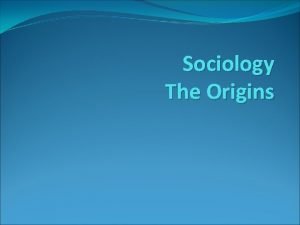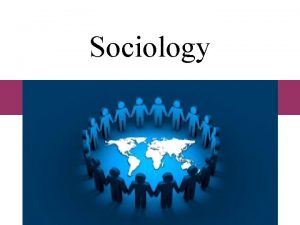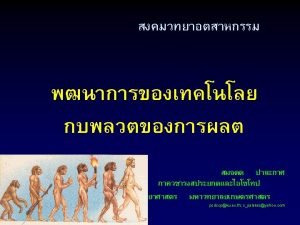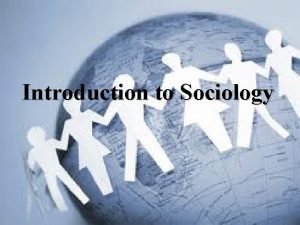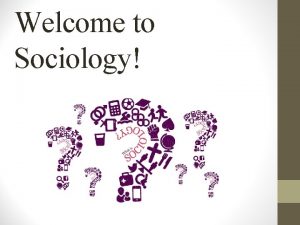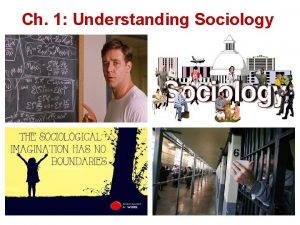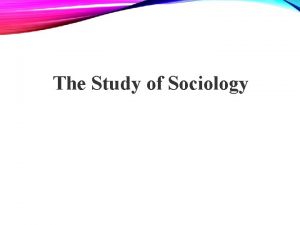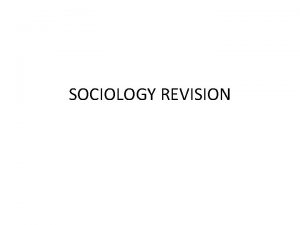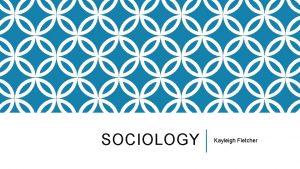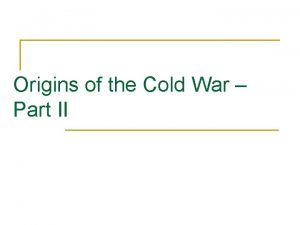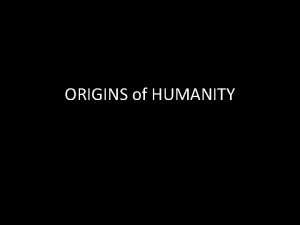THE ORIGINS OF SOCIOLOGY ORIGINS OF SOCIOLOGY Sociology



















- Slides: 19

THE ORIGINS OF SOCIOLOGY

ORIGINS OF SOCIOLOGY • Sociology grew out of social upheaval of early 1800 s • Industrial Revolution - Europe changing from agricultural to factory, rural to urban • The upheaval of the times got people questioning and demanding answers…

THE DISCOVERY OF SOCIAL FACTS • In 1825, the French Ministry of Justice began to collect criminal justice statistics. • Soon, they began collecting data on activities such as suicide, illegitimate births, and military desertion. • Became known as moral statistics because of the moral implications of the activities.

ANDRÉ MICHEL GUERRY • Became fascinated with the statistics and devoted himself to interpreting them. • In 1833, he published the Moral Statistics of France and launched sociology.

GUERRY’S RESEARCH: STABILITY AND VARIATION • Rates were stable from year to year: • In any French city or department, almost exactly the same number of people committed suicide, stole, or gave birth out of wedlock. • Rates varied from one place to another: • The number of suicides varied greatly from city to city

WHY FINDINGS IMPORTANT? • If crime and suicide are purely individualistic (private, personal) then why the macro-level patterns? • Perhaps factors outside the individual? • Guerry and disciples began to think of social forces – population density, economic issues, religious variation

AUGUSTE COMTE • About the same time (early to mid 1800 s) French philosopher argues that scientific method could be applied to social life • Goal to uncover “laws” that govern society … lead to social reform and a better place to live • Coined the term “sociology” – “study of society” • Often credited with being “founder” of sociology

DURKHEIM AND SUICIDE • In, 1897 Frenchman, Émile Durkheim, published Suicide. • Durkheim called himself a sociologist – term from Comte, method from Guerry • First to think of Theory and Research • Stressed that high suicide rates reflect weaknesses in the relationships among members of a society, not in the character or personality of the individual. • Later would call this social integration

INDICATORS OF SOCIAL INTEGRATION? • Protestants (and Prot regions) had higher rates of suicide. Why? Because encourages in freedom of thought and individualism • Males? Because greater independence than females • Unmarried? • Same patterns (Prot, male, unmarried) hold today

FREE WILL…………. . DETERMINISM • Free will = humans act according to the dictates of their own will • Determinism = human actions determined by factors (physical, biological or environment) outside the individual • “Soft determinism” • Rational Choice = human actions free but predictable

FREE WILL………. …DETERMINISM • Sociological theories of crime do not assume that criminals have no choices. Instead, they concentrate on how different people have a different basis for making choices and different alternatives from which to choose • People make rational choices. This makes their behavior free and predictable • Example: sell $20 for 35 cents • We can predict what they will do without seeing them as predetermined robots

THEORETICAL PERSPECTIVES • A Theoretical Perspective is a set of assumptions about an area of study. It is a way of looking at the world. • The three theoretical perspectives of sociology • Functionalism • Conflict Perspective • Symbolic Interactionism

FUNCTIONALISM • Emphasizes the contributions of each part of society. • Sees society as a system or organism • Social institutions are structured to maintain stability and order • Examples • Religions exist to reinforce moral values • Political parties exist to give citizens options on how they should be governed • Schools exist to help prepare students for adulthood • Ideas like nationalism exist to bring communities together

FUNCTIONALISM • Manifest functions: Intended and recognized • Latent functions: unintended and unrecognized • Example: In school you can learn math skills (manifest) but you also learn to socialize (latent) • Dysfunction: Negative consequences of an aspect of society • Example: pollution from carbon emissions

CONFLICT PERSPECTIVE • Emphasizes conflict, competition, change, and constraint in society • Sees society as a number of groups with competing interests • Social institutions are structured to maintain inequality and conflict among groups of people • Examples • Religions exist to provide leaders with justification to rule • Political parties exist to give people the illusion of choice, when in fact, both parties govern almost the same • Inequality in schools exist to insure that upper class children will have the upper hand in life • Ideas like nationalism exist to keep citizens of nations fighting with each other, instead of demanding change from their leaders

CONFLICT PERSPECTIVE • Focuses on the question, “who gets what? ” • Groups with the most power-the ability to control the behavior of other-get the largest share of whatever is considered valuable. • Groups in power protect their privilege by limiting the less powerful. Maintaining the status quo.

EXAMPLES?

SYMBOLIC INTERACTIONISM • Studies the ways in which people interact • A Symbol is something chosen to represent something else. • Examples • Team mascot • Hand gestures • Facial expression • Language • Traffic lights

SYMBOLIC INTERACTIONISM • We learn the meaning of symbols based on how we see others reacting to it • Once learned, we base our behavior off of symbols • We use the meanings of symbols to imagine how others will respond to our behavior. • Example: People dress professionally when going to job interviews • Dramaturgy: Human interaction is similar to a theatrical performance.
 The origins of sociology
The origins of sociology Thế nào là mạng điện lắp đặt kiểu nổi
Thế nào là mạng điện lắp đặt kiểu nổi Mật thư tọa độ 5x5
Mật thư tọa độ 5x5 Lời thề hippocrates
Lời thề hippocrates Vẽ hình chiếu đứng bằng cạnh của vật thể
Vẽ hình chiếu đứng bằng cạnh của vật thể Chụp phim tư thế worms-breton
Chụp phim tư thế worms-breton Quá trình desamine hóa có thể tạo ra
Quá trình desamine hóa có thể tạo ra Khi nào hổ con có thể sống độc lập
Khi nào hổ con có thể sống độc lập điện thế nghỉ
điện thế nghỉ Các châu lục và đại dương trên thế giới
Các châu lục và đại dương trên thế giới Các loại đột biến cấu trúc nhiễm sắc thể
Các loại đột biến cấu trúc nhiễm sắc thể Thế nào là sự mỏi cơ
Thế nào là sự mỏi cơ Bổ thể
Bổ thể Phản ứng thế ankan
Phản ứng thế ankan Làm thế nào để 102-1=99
Làm thế nào để 102-1=99 Thiếu nhi thế giới liên hoan
Thiếu nhi thế giới liên hoan Hát lên người ơi alleluia
Hát lên người ơi alleluia Tia chieu sa te
Tia chieu sa te Một số thể thơ truyền thống
Một số thể thơ truyền thống Sơ đồ cơ thể người
Sơ đồ cơ thể người





















